Film Inquiry Recommends: The Cinema Of Alex Cox
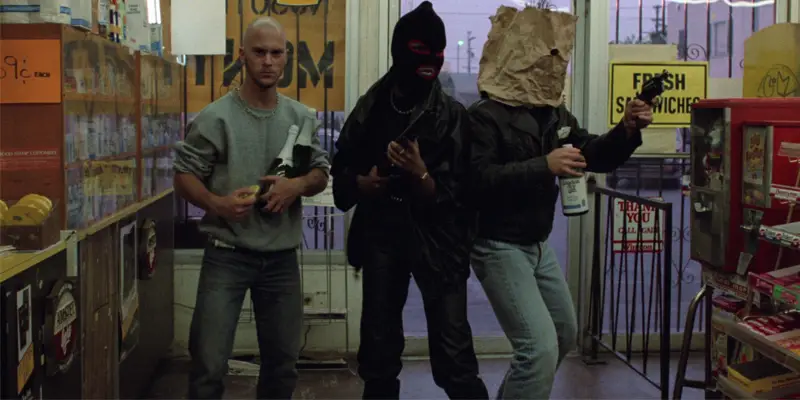
Alex is a 28 year-old West Australian who has a…
Over at our official Facebook page, we are currently posting daily film recommendations with each week being a different theme.This week’s theme is the films of British cult director Alex Cox, and this article is a collection of those recommendations!
The definition of the “cult movie” director, Alex Cox has had an incredibly interesting career, flirting with both studio and independent filmmaking – imprinting his own unique anarchic vision with each film he makes. His films are well known for their punk-rock attitudes and anti-establishment values that defy modern film tropes in the pursuit of unique story-telling and unpredictable narratives.
Technical elements of his work include the use of long takes, Peckinpah-esque violence, Spaghetti Western-inspired atmospheres and surreal plots that don’t conform to the standard hero’s journey style in storytelling. Much like many established directors, Cox has a small cast of actors who appear in all his films which include Sy Richardson, Miguel Sandoval, Dick Rude and Xander Berkley. Outside of his own work, Cox’s most prominent credit is co-writing the script to Terry Gilliam’s, Fear and Loathing in Las Vegas (writing alongside his wife Tod Davies), a credit that Cox had to vehemently fight for after Gilliam took full credit for his re-writes to the script.
Outside of his cinematic work, Cox is the author of several non-fiction books; just recently releasing his own introduction to film analysis and creation (Alex Cox’s Introduction to Film: A Director’s Perspective). He is also well known for MovieDrome, a BBC series which started in 1988 which featured Cox introducing a series of underrated/cult films every week. The idea of repurposing old films for a new audience, highlighting their ideals and their contextual importance is something quite prominent throughout Cox’s work, which visually references his influences quite often.
1. Repo Man (1984, Alex Cox)
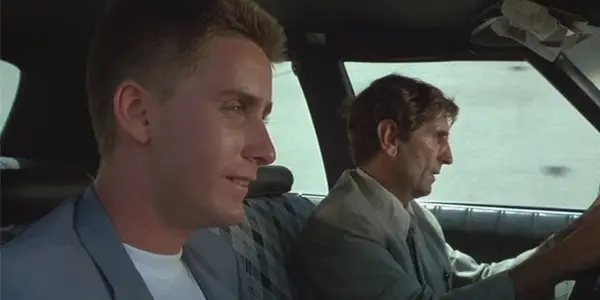
Cox’s most well known film, Repo Man is his feature film debut and the one that highlights his non-mainstream values and unique cinematic voice. Originally planned as a $70,000 micro-budgeted feature film, Cox’s original script (which was paired with a 4 page comic book to highlight its satirical tone), was picked up by The Monkees member Michael Nesmith, who loved it and gave it to Universal Pictures. Much like many troubled productions, Universal executives initially had a lot of faith in the film, but a management change halfway through the production disrupted this, as the new staff didn’t like what they saw and quietly buried the film upon release.
Taken out of the cinemas after a week (it bombed horribly due to Universal’s lack of marketing, despite being critically acclaimed), the film was granted a second life due to the surprise success of itis compilation soundtrack, which featured a mix of original and beloved punk tracks from artists like Iggy Pop, Black Flag and Suicidal Tendencies. This soundtrack is one of the first successful movie soundtracks that used licensed songs rather than original score – a tradition that would go become a staple of most mainstream films today (just look at the success of the Suicide Squad soundtrack). A definitive cult film, Repo Man is a crazy blend of American satire, 70’s paranoia thrillers and old school sci-fi that is a unique product that still remains quite relevant and just as effective today, despite its somewhat aged punk aesthetics.
Repo Man follows Otto Maddox (Emilio Estevez), a young punk rocker who, through a chance encounter with Bud (the great Harry Dean Stanton) gets into the lucrative but sleazy car repossession business. At the same time, renegade scientist Dr. J. Frank Parnell (Fox Harris), is on the run with a mysterious vehicle, one which emits an ambiguous green light that vaporizes anyone that looks directly at it (a nod to Kiss Me Deadly). As news of this car starts to circle around Los Angeles, the government puts out a large bounty for the mysterious car, which puts it on Otto’s radar, who decides to locate the car to prove his worth within his new job.
Repo Man introduces us to Cox’s unique directional style, which features the subversion of standard story-telling, an anti-establishment view on mainstream movie-making which highlights just why this movie is still loved today. The film’s often shifting narrative path goes against traditional story delivery methods which, in turn, makes the film constantly unpredictable and wholly original – a type of film that is rarely made in the mainstream arena today.
The satirical elements are grounded in the film’s sleazy depiction of Los Angeles, portrayed as a sordid plane of existence swarming with people who are out for themselves and no-one else. If you haven’t yet, Repo Man is definitely worth watching. It is a film fully deserving of its Criterion Collection rerelease which introduced this quirky film to a new generation of filmgoers.
2. Sid & Nancy (1986, Alex Cox)
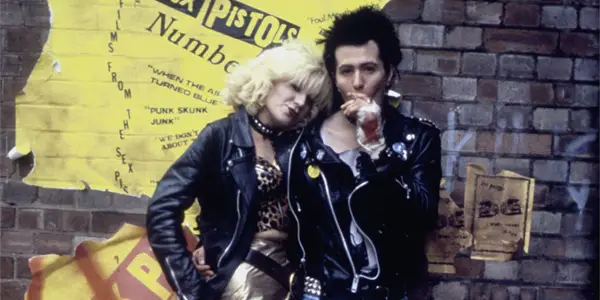
Outside of his off-beat directional work, Alex Cox should be recognized for his outspoken work in keeping cult and arthouse cinema alive, most notably through his UK-bound Moviedrome series. Starting in 1988, Alex Cox hosted the BBC series where every week, he would introduce and show an alternative/arthouse film at a time when film information wasn’t so obtainable to get.
His energetic introductions brought forth a plethora of obscure movies for a new generation of film watchers – expanding their internal catalogue of films. Whilst the internet has made these types of programs redundant nowadays (even though Trailers From Hell have done a great online version of this same format), it is important to keep the spread of information pertaining to obscure/underrated films alive. This is one of the big reasons behind the writing of these recommendation articles.
Sid and Nancy tells a mostly fictional depiction of the relationship between Sid Vicious (Gary Oldman), the bassist of the hugely influential punk band The Sex Pistols and his girlfriend Nancy Spungen (Chloe Webb). The film details the destructive and downward-spiraling relationship between the two as they first meet in 1977 when Nancy was a groupie who sold Sid heroin. This sparked a drug-fueled love affair that would result in the tragedy for everyone involved, especially for The Sex Pistols.
Cox’s attitude toward his subjects is purposefully and unapologetically pessimistic. When describing Sid’s life, he felt that, “Sid had sold out, contributed nothing of value, [and] died an idiot.” This negative portrayal is quite evident within the film, as the it shows Sid as a trashy musician who died in obscurity thanks his drug addiction and toxic relationship with Nancy. Some people have viewed the film as endearing in its depiction of the titular couple; showing that outside of the horrendous drug use and deteriorating physical states, there was a sweet romance in the center of it.
Whilst that can be argued, you can see Cox’s pessimism for the subject matter seep through at the end when Sid and Nancy ‘die,’ as shown through a metaphorical scene in which they enter the back of a dingy taxi and fly off into the sky – a greasy punk-rock take on the famous last scene of Grease. Instead of the scene being this romantic and heavenly image, Cox reduces it to an artificial grungy affair, stripped of any delightful romanticism. This example just shows Cox’s interesting directional style, his punk-rock pop culture infused films which have become increasingly underrated as the years roll on.
3. Straight to Hell (1986, Alex Cox)
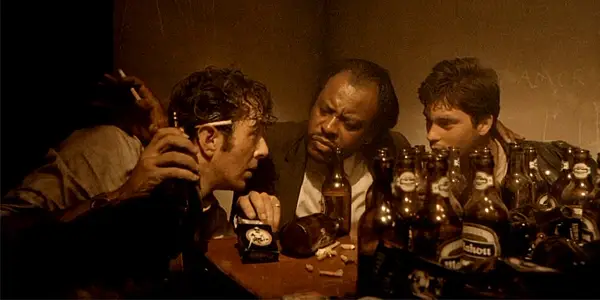
In a recent interview with UK film critic Mark Kermode, Alex Cox talked about the variety of films he featured during his Moviedrome film series, stating, “some of the films were brilliant, but some of the films had problems, and the great thing about Moviedrome was that it was possible to acknowledge that, it was possible to say that the film is not very good BUT it has very good editing or a terrific supporting role.” The idea that a film may not work as a cohesive package, but features elements that are noteworthy, is one of the most important aspects when it comes to film criticism. It is something that gets lost when a bad review simply boils a movie down to, “this film sucks,” – a style of reviewing that easily takes over social media networks. With this in mind, we can talk about Alex Cox’s messy spaghetti western tribute Straight to Hell.
Made after Cox’s two most well known films (Sid & Nancy and Repo Man), he attempted to make a concert film featuring several bands (The Pogues, The Clash, Elvis Costello and more) down in Nicaragua, a country that he really wanted to shoot in due to its landscapes being frequently used in many Spaghetti Western films of the past. Due to a shifting political climate and lack of funding, Cox decided to just make a feature film himself, using all the different band members that suddenly had nothing to do.
Deciding to base the narrative on Giulio Questi’s Spaghetti Western film Django Kill…If You Live, Shoot! (which Cox actually got permission to adapt), the film is a satirical comedy that blends the Spaghetti Westerns and American gangster film genres. It is the epitome of the midnight/cult film – a critically reviled movie which has built a growing dedicated audience since its release. It’s a response that led to Alex Cox rereleasing the film in 2010 and retitling it Straight to Hell: Returns. It features a complete HD transfer of the film, added deleted scenes and inserted blood/gore FX which were taken out originally in an attempt to create a PG-13 acceptable film (a decision that failed as the film still received an R rating for unknown reasons).
Straight to Hell centers on three hitmen: Willy, Norwood, and Simms (Dick Rude, Sy Richardson, and Joe Strummer), who, after a failed bank robbery, take a pregnant female hostage (Courtney Love, before her fame via Nirvana) and head down to Mexico to escape authorities. After their getaway, they eventually come across an isolated Western town filled with a series of unwelcome townsfolk. The hitmen discover that the town is run by a gang of coffee-addicted cowboys (played by the Pogues) who rule with an iron fist. As the gang start to find out about the true identities of the new hitmen, they unknowingly trigger a gang war which starts to put the entire town at risk.
Due to the low budget and rushed nature of the production, the film’s narrative is quite loose and not very cohesive. Even with the film’s short running time, the film starts to drag as there seems to be no narrative focal point and you get the feeling that Cox is making it up as he goes along (a feeling which he has used well in some of his other low budget features).
Despite this, the film does have some positive elements as the cinematography and general Spaghetti Western atmosphere is captured quite well by Australian cinematographer Donald McAlpine, who recently worked on The Dressmaker, another unfocused Spaghetti Western tribute. It is worth tracking down a copy of Straight to Hell Returns, which is an improved version on the original film, but sadly the DVD is currently out of print. Fans of Spaghetti Westerns and Alex Cox’s anarchic attitude will really dig this film, despite its story-telling shortcomings.
4. Walker (1987, Alex Cox)
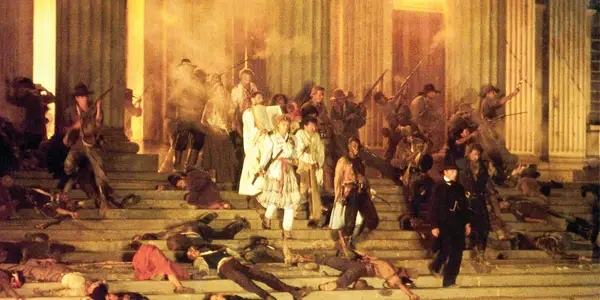
The biographical film that really pushed the limits on the, “based on the true story,” aspect of film-making, Cox’s highly divisive William Walker biography, Walker,is a film much better than its initial lukewarm reception, another film that, much like most of Cox’s filmography, has grown considerably since its release once people started to discover it on home media.
After the underground success of both Repo Man and Sid and Nancy, Cox had an opportunity to finally make a studio-funded mainstream film, being given the budget of $6 million (which still remains the biggest budget of his career), and decided to make a biography on William Walker after being fascinated by his story. Shot in Nicaragua (the same place as Straight to Hell), Walker uses William Walker’s historical tale as a foundation to explore themes of political corruption and control, pointing out how sadly prevalent these problems are in society, following the old adage of, “those who do not learn from history are doomed to repeat it.”
Ed Harris stars as William Walker, an American soldier-of-fortune who is hired by American multimillionaire Cornelius Vanderbilt (Peter Boyle), who needs Walker’s help in stopping a civil war within Nicaragua to create stability and allow Vanderbilt’s company to create a much sought-after shipping route throughout the region. Backed up by a renegade army of 60 soldiers, Walker decides to overtake Nicaragua for himself, making him a self-imposed president and ruling the torn country with an iron fist.
One of the most notable aspects about this film that sets it apart from most historical biopics is the lack of factual restraints, as Cox frequently diverges from the already crazy story. Elements of Cox’s punk-rock style in the film include the history-breaking production design such as the inclusion of cars, helicopters and computers throughout the 1600s.
All this is done in a comically disregarded fashion that recalls the works of Monty Python in its intentional ignorance for accuracy. Ed Harris dominates the main role of Walker, giving a performance of extreme intensity that really gives humanity to the power-hungry individual. Whilst regarded as a bad film due to its poorly-handled initial release, Walker is definitely a great film, one which pushes the boundaries of the well-worn biopic genre.
5. Highway Patrolman (1992, Alex Cox)
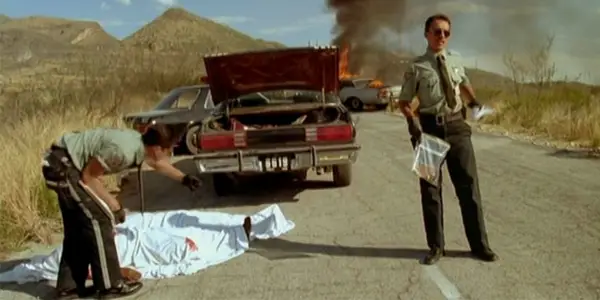
Due to the box office failure of Walker and his attempts to work during the 1988 Writers Guild of America strike, Alex Cox was effectively blacklisted from Hollywood feature projects (a term usually referred to as ‘director’s jail’ where a director finds himself unable to obtain paid work for a variety of past reasons). Due to the huge success of his 4 previous films in Japan (especially Straight to Hell), several Japanese investors decided to fund a new feature film for Cox, who was looking at making a film in Spain.
Highway Patrolman (usually referred to as El Patrullero) shows a transition towards a much different type of film-making for Cox, as his previous 4 films were shot in a traditionally cinematic fashion and featuring purposefully subversive narratives and graphic cinematography. With Patrolman, in an effort to pay tribute to a variety of Mexican filmmakers that had influenced his work, Cox shot Patrolman in full Spanish (as opposed to English speaking Mexicans with an accent), using documentary aesthetics and shifting towards more realistic and restrained story-telling, a successful transition for the versatile director.
Highway Patrolman focuses on the career of Pedro Rojas (Roberto Sosa), a young innocent recruit who begins his career as a highway patrolman, starting in a grueling training camp where Rojas meets his friend/work partner, Anibal Guerrero (Bruno Birchir). Gradually Rojas goes from a sweet-natured and well-meaning cop to a hardened and bitter policemen with his tolerance for crime growing increasingly thin through a series of shocking interactions.
The narrative is mostly episodic as it chronicles Pedro’s different police activities that each influence his shift in character (which might seem meandering and plotless to some viewers). This is much inline with Cox’s other films, a bunch of great singular scenes that are pieced together by a stray and minor overall plot that doesn’t quite conform to the mainstream idea of feature-length storytelling.
The film’s grounded and realistic take on everyday police work is a refreshing change to the typical American superficial cop films that are released by the hundreds everyday. This is quite unheard of nowadays (even for Alex Cox’s films), and Highway Patrolman is an engaging little drama that is certainly one of his best films.
6. Three Businessmen (1998, Alex Cox)
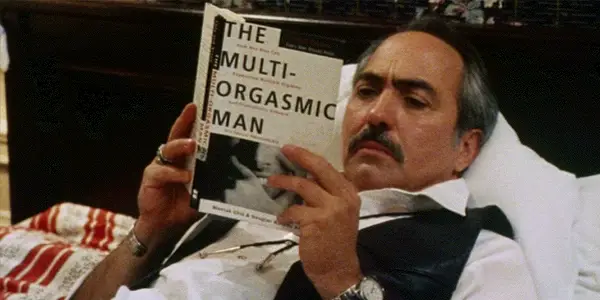
Three Businessmen is one of Cox’s lesser known features, an interesting film which feels like a mixture of Louis Malle’s influential drama My Dinner With Andre remixed with Luis Bunuel’s The Discreet Charm of the Bourgeoisie. My Dinner with Andre was a film most notable for being a feature-length narrative that was purely based on a fictionalised conversation, a dialogue-heavy piece which explores a variety of different intellectual topics in a very restrained manner.
Despite being called Three Businessmen, majority of the narrative is focused on 2 clashing personalities who meet in Liverpool; the brash American, Benny (Miguel Sandoval), and quiet Englishman Frank (Alex Cox), who team up to find a place to eat dinner during a lonely night in Liverpool. During their various methods of transport (bus, boat, walking) to each different restaurant they try out, the 2 men discuss a variety of different subjects with 2 conflicting points of view, Benny’s aggressive American ideals and Frank’s more intellectual and methodical way of viewing the world. As the night goes on, the 2 run into businessman, Leroy (Robert Wisdom), a man who is also coincidentally looking for a place to eat dinner too, joining in their existential conversation.
Miguel Sandoval (recently seen though unrecognizable in his role in the terrific Blood Father), gives the film its much-needed momentum – injecting the narrative with an impulsive energy that makes the meandering story feel engaging. Alex Cox, whilst not a natural actor, does a fine job as Frank, even though his acting comes across as not being too much of a stretch for the naturally charismatic director. Shot in a naturalistic style similar to his experimental work in Highway Patrolman, Three Businessmen is one of Cox’s more accessible work, stripped of his more outlandish elements to focus on some interesting dialogue and notable character interactions.
7. Revengers Tragedy (2002, Alex Cox)
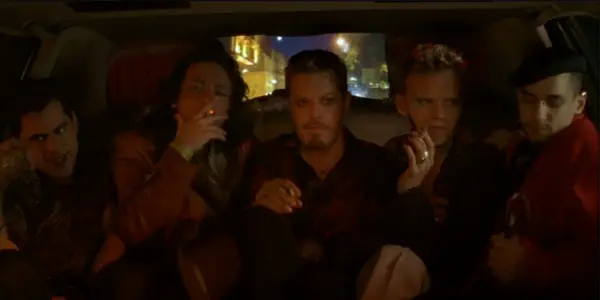
Another one of Cox’s lesser known films, Revenger’s Tragedy is a Baz Luhrmann inspired adaptation of Thomas Middleton’s 1606 revenge play, a cynical and satirical tale about the ripple effects of revenge and the clashes between class structures. A return to his established filmmaking style executed in his earlier work, Revenger’s Tragedy is actually one of his more accessible films, a fairly straight- forward adaptation of the classic revenge tale. Despite some crazy images that we’ve come to expect from Cox, it is quite approachable for a mainstream audience; featuring some great acting, tight story-telling and inspired visuals.
Cox has shifted the Italian-set 1600’s tale to a post-apocalyptic British setting, using the theme of revenge to comment on the current political climate, comparing World War 2 to America’s involvement in the Middle East (an issue that Cox himself has commented about quite frequently). Christopher Eccleston stars as Vindice, a man obsessed with getting revenge on the Evil Duke (Derek Jacobi), a powerful crime lord who killed Vindice’s wife several years prior. They team up with his brother, Carlo (Andrew Schofield) and sister, Castiza (Carla Henry) to take down the Duke’s empire through his assortment of children who are obsessed with crime and power – their main target being the isolated step-son, Lussurioso (Eddie Izzard).
Revenger’s Tragedy is Cox’s last great film (his last 3 films, Repo Chick, Searchers 2.0 and Bill the Galactic Hero are micro budget experiments that sadly don’t work), an interesting translation of the classic tale. The film escapes its low budget trappings, thanks to dedicated performances by its lead actors, especially Christopher Eccleston and Eddie Izzard. The use of long takes, one of Cox’s directing trademarks, pops up quite frequently in this film (which must’ve been a strain to these actors, due to the complicated Jacobian material) and gives the film quite a theatrical feel. Whilst not for everyone (the old school dialogue might throw people off), Revenger’s Tragedy is definitely one of Cox’s most competent and well put together films.
What is your opinion on Alex Cox’s diverse array of films?
Does content like this matter to you?
Become a Member and support film journalism. Unlock access to all of Film Inquiry`s great articles. Join a community of like-minded readers who are passionate about cinema - get access to our private members Network, give back to independent filmmakers, and more.













